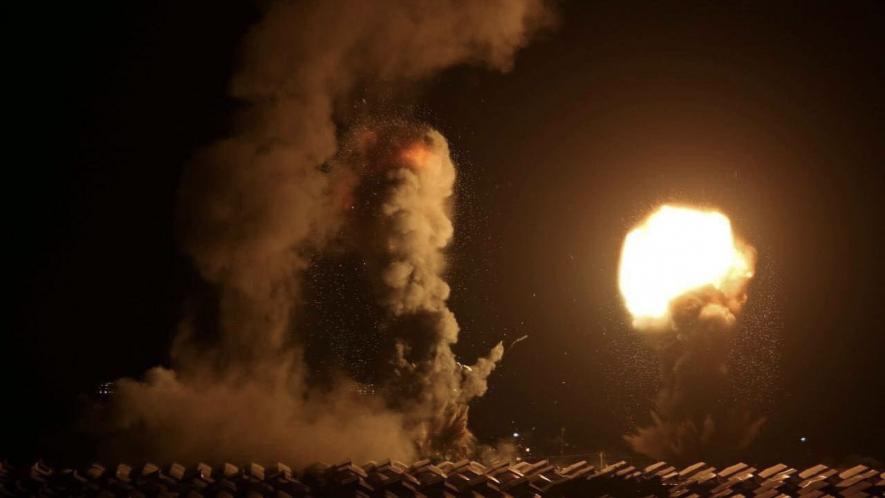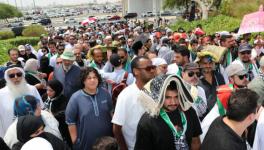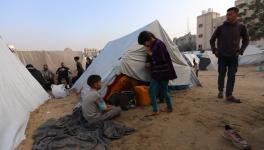‘Suffocating Occupation’ of Palestine is now a Series of War Crimes

On the night of October 27, Israel cut all communication services in Gaza and intensified the aerial bombing campaign.
On October 24, it became clear to the United Nations (UN) that the sustained bombardment of Gaza—which had already killed 6,500 people (including at least 35 UN employees)—had made this part of Palestine unviable for human life. Over two million people live in this slim section of land on the Mediterranean Sea. Since 1948, the refugees who live here have relied on UN assistance, with the United Nations building an entire agency (UNRWA) in 1949 for that purpose.
UN Secretary General António Guterres told the UN Security Council that within days the UN would run out of fuel for its trucks, which carry the minimal relief that crosses into Gaza from Egypt and supports the 660,000 Palestinians who have fled their homes to come to UN compounds across Gaza. The trucks carry “a drop of aid in an ocean of need,” Guterres said. “The people of Gaza need continuous aid delivery at a level that corresponds to the enormous needs. That aid must be delivered without restrictions.”
Guterres’s statement, delivered in a calm voice, did however depart from the sentiment of disregard that defines the statements of European and North American leaders—many of whom have rushed to Tel Aviv to stand beside Israeli Prime Minister Benjamin Netanyahu and pledge their full-throated support for Israel.
History matters. Guterres said that the problems now befalling the Palestinians of Gaza did not begin on October 7, when Hamas and other Palestinian factions broke through the apartheid security barrier and attacked the settlements that border Gaza.
His statement on the situation over the past decades is factual, based as it was on thousands of pages of UN reports and resolutions: “It is important to also recognize the attacks by Hamas did not happen in a vacuum. The Palestinian people have been subjected to 56 years of suffocating occupation. They have seen their land steadily devoured by settlements and plagued by violence; their economy stifled; their people displaced, and their homes demolished. Their hopes for a political solution to their plight have been vanishing.” The image of the “suffocating occupation” is utterly accurate.
After Guterres made these remarks, Israeli authorities—as if on cue—demanded the resignation of the UN Secretary-General. Israel’s permanent representative to the UN Gilad Erdan accused Guterres—absurdly—of “justifying terrorism.” Saying that Guterres “once again distorts and twists reality,” Erdan noted that his government would not permit the UN Humanitarian Aid chief Martin Griffiths from crossing the Rafah border into Gaza to oversee the distribution of relief. “In what world do you live?” asked Israeli Foreign Minister Eli Cohen of Guterres.
At the UN Security Council, meanwhile, the United States vetoed resolutions for a ceasefire, while China and Russia vetoed a US resolution that said Israel had a right to defend itself and Iran must stop its export of arms. The United States has deeply politicised the atmosphere in the UN, using its own resolutions to rally support—unsuccessfully—for Israel, while attacking the Palestinians (and bizarrely Iran) in the process.
Nothing Neutral About the United States
The United States has never been an unbiased arbiter over the region, given its close linkage to Israel from at least the 1960s. Billions of dollars of weapons sold to Israel, billions of dollars of aid to Israel, and punctual statements in favour of Israel have defined the relationship between Washington and Tel Aviv.
During all the negotiations between the Palestinians and Israelis, the United States has played a game of duplicity: pretending to be neutral, but in fact, using its immense power to neuter Palestinians and to strengthen Israel.
The Oslo Accords, which led to the creation of a powerless Bantustan run by the Palestinian Authority, was negotiated with the United States with its hands on the pen. Oslo led to the creation of a process that has resulted in the attrition of Palestinian control over East Jerusalem and the West Bank as well as the garrotting of the Palestinians in Gaza—all of this combined being the “suffocating occupation” that Guterres talked about.
Since 2007, when Israeli troops left Gaza and then hemmed it in by land and sea walls that made Gaza the world’s largest open-air prison, Israel has routinely bombed the Palestinians who live there. Each time there is a bombardment, one worse than the next, the United States government has backed Israel fully and re-armed it during the bombardment.
Calls for a ceasefire have been blocked by Washington in the UN Security Council since the destructive bombing of Gaza called Operation Cast Lead (2008-09). This time, on cue, the United States has provided Israel with diplomatic support, with President Joe Biden going to Tel Aviv and with the United States going as far as adopting a flagrant lie that Israel did not bomb al-Ahli Arab Hospital in Gaza City on October 17.
Before Biden got to Israel, the United States sent two major naval battle groups into the eastern Mediterranean—two aircraft carriers, the USS Dwight D. Eisenhower and the USS Gerald Ford, with their supporting naval vessels in two strike groups.
Since then, the US has moved missile defence systems into the region to strengthen the Israeli armed forces. The movement of these forces comes alongside billions of dollars spent annually by the US to arm Israel, including $15 billion in extra military assistance over this recent period. These wars are not merely Israel’s wars. These are the wars of Israel and the United States, with its Western allies in tow.
Gaza Will Become Mosul
Meanwhile, the United States has sent senior military officials to work closely with the Israeli generals. One of these officials is a three-star Marine lieutenant general James Glynn, who has been sent to “help the Israelis with the challenges of fighting an urban war.”
Glynn and others are in the Israeli military chain of command not to make decisions for Israel but to assist them. Glynn was part of the US Operation Inherent Resolve against the Islamic State of Iraq and Syria (ISIS) in the years following 2014, when the United States bombed Mosul and Raqqa (Iraq) to eject ISIS from those cities.
As if to underline Glynn’s Mosul and Raqqa experience, US Defence Secretary Lloyd Austin told Israel’s Defence Minister Yoav Gallant that he had himself been involved in Operation Inherent Resolve in 2016-2017 when Austin headed US Central Command. Austin’s comments and Glynn’s deployment to Israel are in anticipation of the ground war that is expected against Gaza. “The first thing that everyone should know,” Austin told ABC News, “and I think everyone does know, is that urban combat is extremely difficult.”
Indeed, Austin’s comment about the difficulty of urban combat, particularly with the Mosul and Raqqa experiences in mind, is appropriate. In 2017, the Associated Press (AP) reported that the US attack on Mosul had resulted in between 9,000 and 11,000 civilian casualties. Very few people recall the brutality of that war and the numbers of civilian dead are barely noted.
If Mosul is the example before the United States and Israel for the ground war to come in Gaza, there are some differences that should be borne in mind. ISIS had only two years to dig in its defences, while the Palestinian factions have been preparing for such an eventuality since at least 2005 and are, therefore, better prepared to fight the Israeli army one ruined street after the next.
It appears from all reports that the morale of the Palestinian factions is far greater than that of the Israeli army, which means that the Palestinian factions will fight with much more force and with much less to lose than ISIS (whose fighters slipped out of the city and vanished into the countryside).
In both Mosul and Raqqa, when the US aerial bombardment began, tens of thousands of civilians fled the cities for the countryside alongside some ISIS fighters to wait for the destruction to commence and then end. If they had remained in Mosul and Raqqa, the civilian casualties would have been twice the number reported by AP.
Mosul’s population was just 1.6 million, smaller than the 2.3 million residents of Gaza—so the numbers of civilian casualties would have to be adjusted upwards. Palestinians in Gaza are trapped and cannot escape to the countryside, unlike the residents of Mosul and Raqqa. They can go nowhere as Israeli tanks enter Gaza, guns blazing. The civilian deaths in Gaza, already outrageously high due to the uncontrolled bombing by Israel, will be unimaginable during this ground war that began on October 27. Gaza, already a ruin, will be left a cemetery.
Vijay Prashad is an Indian historian, editor, and journalist. He is a writing fellow and chief correspondent at Globetrotter. He is an editor of LeftWord Books and the director of Tricontinental: Institute for Social Research
Source: This article was produced by Globetrotter.
Get the latest reports & analysis with people's perspective on Protests, movements & deep analytical videos, discussions of the current affairs in your Telegram app. Subscribe to NewsClick's Telegram channel & get Real-Time updates on stories, as they get published on our website.
























